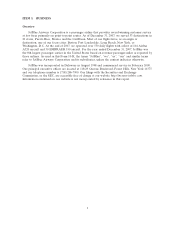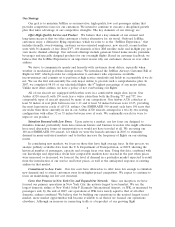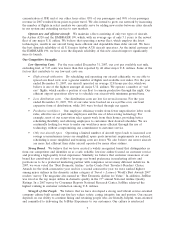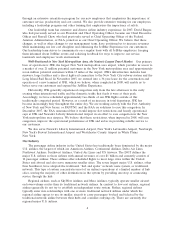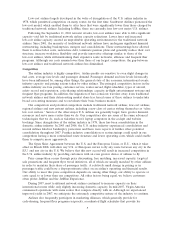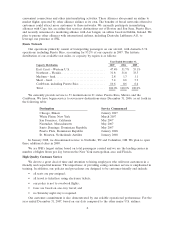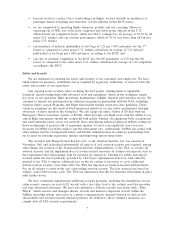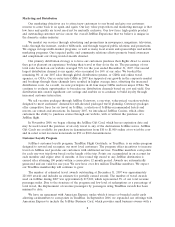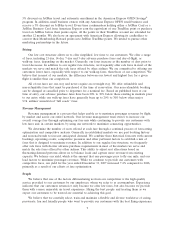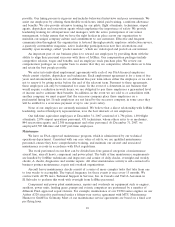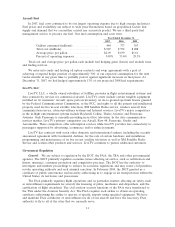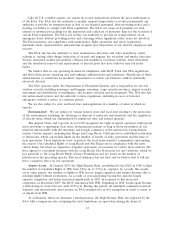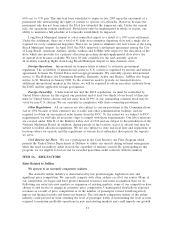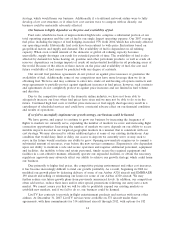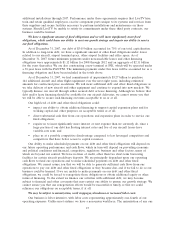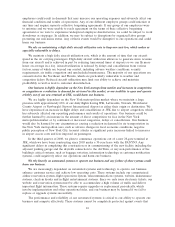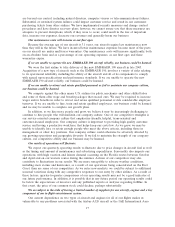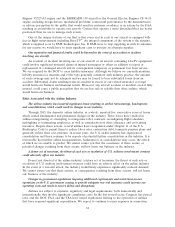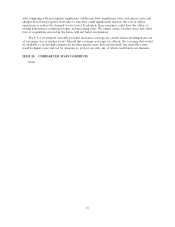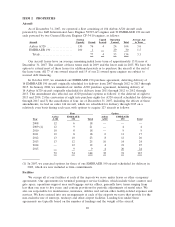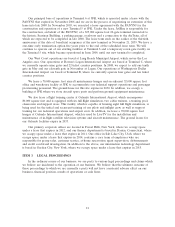JetBlue Airlines 2007 Annual Report Download - page 21
Download and view the complete annual report
Please find page 21 of the 2007 JetBlue Airlines annual report below. You can navigate through the pages in the report by either clicking on the pages listed below, or by using the keyword search tool below to find specific information within the annual report.
Aircraft Fuel
In 2007, fuel costs continued to be our largest operating expense due to high average fuel prices.
Fuel prices and availability are subject to wide price fluctuations based on geopolitical factors and
supply and demand that we can neither control nor accurately predict. We use a third party fuel
management service to procure our fuel. Our fuel consumption and costs were:
Year Ended December 31,
2007 2006 2005
Gallons consumed (millions) ................. 444 377 303
Total cost (millions) ......................... $929 $752 $488
Average price per gallon ..................... $2.09 $1.99 $1.61
Percent of operating expenses................. 34.8%33.6%29.5%
Total cost and average price per gallon each include fuel hedging gains (losses) and exclude taxes
and fueling services.
We enter into crude and heating oil option contracts and swap agreements with a goal of
achieving a targeted hedge position of approximately 30%of our expected consumption for the next
twelve months at any given time to partially protect against significant increases in fuel prices. At
December 31, 2007, we had hedged approximately 13%of our projected 2008 fuel requirements.
LiveTV, LLC
LiveTV, LLC, a wholly owned subsidiary of JetBlue, provides in-flight entertainment systems and
data connectivity services for commercial aircraft. LiveTV’s assets include certain tangible equipment
installed on its customers’ aircraft, spare parts in inventory, an air-to-ground spectrum license granted
by the Federal Communications Commission, or the FCC, and rights to all the patents and intellectual
property used for live in-seat satellite television, XM Satellite Radio service, wireless aircraft data
communication service, cabin surveillance systems and Internet services. LiveTV’s major competitors
in the in-flight entertainment systems include Rockwell Collins, Thales Avionics and Panasonic
Avionics. Only Panasonic is currently providing in-seat live television. In the data communication
services market, LiveTV’s primary competitors are Aircell, Row 44, Panasonic, OnAir and
Aeromobile. These competitors offer subscription services while LiveTV provides free connectivity to
passengers supported by advertising, ecommerce and/or airline payments.
LiveTV has contracts with seven other domestic and international airlines, including the recently
announced agreement with Continental Airlines, for the sale of certain hardware and installation,
programming and maintenance of its live in-seat satellite television as well as XM Satellite Radio
Service and certain other products and services. LiveTV continues to pursue additional customers.
Government Regulation
General. We are subject to regulation by the DOT, the FAA, the TSA and other governmental
agencies. The DOT primarily regulates economic issues affecting air service, such as certification and
fitness, insurance, consumer protection and competitive practices. The DOT has the authority to
investigate and institute proceedings to enforce its economic regulations and may assess civil penalties,
revoke operating authority and seek criminal sanctions. In February 2000, the DOT granted us a
certificate of public convenience and necessity authorizing us to engage in air transportation within the
United States, its territories and possessions.
The FAA primarily regulates flight operations and, in particular, matters affecting air safety, such
as airworthiness requirements for aircraft, the licensing of pilots, mechanics and dispatchers, and the
certification of flight attendants. The civil aviation security functions of the FAA were transferred to
the TSA under the Aviation Security Act. The FAA requires each airline to obtain an operating
certificate authorizing the airline to operate at specific airports using specified equipment. We have
and maintain FAA certificates of airworthiness for all of our aircraft and have the necessary FAA
authority to fly to all of the cities that we currently serve.
11


